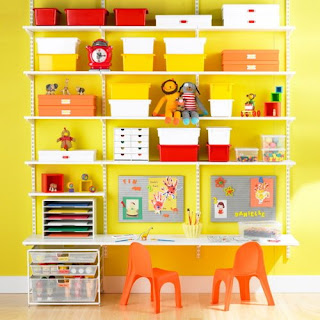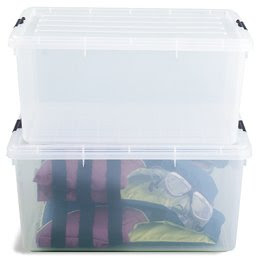One reason I've been putting off writing about basements is because there is so much variance from one basement to the next, which makes it tricky for me to write something concise that everyone can benefit from. Everything I say here will greatly depend on the configurations of your basement and really, how much stuff you have in it, what you use your basement for and whether or not you have kids. So, knowing that, read on...
As with everything, I like to start by taking a general inventory. What is in your basement? Go through everything you have down there. Figure out what is vital to your existence and what can move on to another family or the landfill. Once you have made your final selection, do a very, very, very, very deep clean. Basements are usually stinky and often left unclean on a regular basis.
Unless your basement is the size of a small shoe box and you literally only use it for storage, I would advise you to create zones for your basement. These zones are to help you to identify the purposes of the basement. Do you use your basement just as a super large storage room? Is your basement a part of your living space? Do your kids use this space as a play room? Is your basement finished or unfinished? Is your basement a "man cave"? Do you keep your sewing and scrapbooking and other hobby projects in the basement? Is your basement your tool room? Does your basement have actual finished rooms or is it one open space? Can you entertain in your basement? Those are some questions I came up with off the top of my head that may help you to identify various zones for the space. If you've got a lot going on in your basement creating zones will help unify the space as a whole while giving each area its own function.

Before I move on, I must caution you to consider if it is possible at any given time for your basement to either flood or get damp floors. Knowing and preparing for this can be a lifesaver if you ever have to deal with water in your basement. That said, consider shelving that is off the floor or plastic storage bins if you must store things on the floor.

This space is like any other in your home. When you create your zones think about how you can best organize each individual zone. Most zones have different capabilities and needs. Consider using plastic storage bins (from super teeny to huge gigantic tubs), cubbies, any variety of shelving, baskets, a set of drawers of any kind, file cabinets, cardboard boxes, buckets or specialized organizational paraphernalia for things like tools, scrapbooking or housing a hobby collection. Place your items nicely on a shelf, on the ground, on a table or wherever works for you in your zone. Make everything look nice, write a descriptive label and move on.
The vital part to this overhaul is following through. After you use something from your zone make sure to put it back where it goes! This sounds so incredibly trivial but I think this is the most common misstep of anyone and everyone. You need to follow through. You worked so hard to clean out your basement and create an organizational system that works for you and looks nice, so why would you not follow through by putting things away? Reward yourself if after one, two, six, twelve months goes by and you still have a wonderfully organized basement. That is something to celebrate - especially if you have a basement like some I have seen.




No comments:
Post a Comment